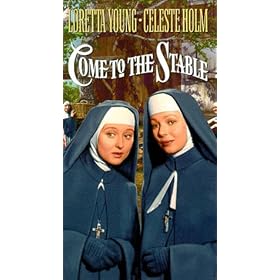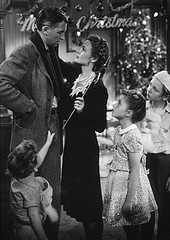
Continuing with my recent theme...
I discovered a number of these movies from a Crisis Magazine article on the
Vatican Movie List a number of years back. I couldn't find the original article online, but vaguely remember that it expanded on certain themes in the original list with additional suggestions. I remember looking for
You Can't Take it With You for years, before our library finally purchased it (this was obviously well before Netflix came into the picture).
I would consider these appropriate at least for my teenager (though often the whole family will enjoy it, even if they don't understand the whole thing), you might want to preview them to decide age level beyond that...
The Philadelphia Story (1940) - Katherine Hepburn, Jimmy Stewart, Cary Grant - This is kind of the reverse side of Holiday - The rich have their problems too, but even the hard-working newly "made it" can be overly star-struck and insincere. There's also a musical based on this story called
High Society starring Bing Crosby, Frank Sinatra, Grace Kelly and Louis Armstrong.
Holiday (1938) - reviewed
hereThe Awful Truth (1937) - Cary Grant and Irene Dunne are a married couple who decide to split up after a spat - this a comedy about the breakup of the wife and her new boyfriend. I love the upside-downness of it - in a good way!
It Happened One Night (1934) - One of Frank Capras earlier movies and the original road trip film. Claudette Colbert is a rich heiress on the run from her father who meets Clark Gable on a bus trip from Florida back to her home in New York. When we had the subtitles on here, we noticed a little mature content in the lyrics of a song (that we had never noticed before). Also a few slightly risque scenes.
You Can't Take it With You (1938) - Classic Frank Capra - Jean Arthur, Jimmy Stewart, Lionel Barrymore star in this outrageous comedy about money, family, and what really matters. Great fun for the whole family.
Mr. Deeds Goes to Town (1936) - Gary Cooper is a plainspoken man from the sticks who arrives in New York City because he's inherited a large fortune from a long-lost uncle. Jean Arthur is a reporter who feigns interest in him to get the insight scoop on his "odd" ways. A lot of fun and a great one for the whole family.
Bringing Up Baby (1938) - Cary Grant and Katherine Hepburn are taking care of a very tame leopard who brings them into all sorts of hilarious situations. Another family favorite.
Bachelor Mother (1939) - Ginger Rogers is a young working mother who is mistakenly believed to be the mother of a baby left at an orphanage. When her employer is contacted (who kindly wants to help her keep the baby and her job) she feels she has to keep the baby.
We also enjoy some of the Marx Brothers and Laurel and Hardy movies, but I couldn't tell you off the top of my head which were our favorites. We watched a Marx Brothers movie last night called
Horse Feathers which was outrageously funny and clever, but not the kind I'd like my kids to see all the time.
 movie "Young Mr. Lincoln" for all ages. The 1939 fictionalized tale is black-and-white, which only adds to its historical feel. My youngest children don't realize this isn't actual footage. Henry Fonda plays the young lawyer as he progresses from shop owner to practising lawyer. All the good legends are included in the 100 minutes: his love of books, being honest, log cabin poverty, going the extra mile, and young love. Best of all is the tough case he takes on behalf of a woman whose son was unjustly accused of murder. A griping tale of wits. How can Mr. Lincoln prove him innocent?!
movie "Young Mr. Lincoln" for all ages. The 1939 fictionalized tale is black-and-white, which only adds to its historical feel. My youngest children don't realize this isn't actual footage. Henry Fonda plays the young lawyer as he progresses from shop owner to practising lawyer. All the good legends are included in the 100 minutes: his love of books, being honest, log cabin poverty, going the extra mile, and young love. Best of all is the tough case he takes on behalf of a woman whose son was unjustly accused of murder. A griping tale of wits. How can Mr. Lincoln prove him innocent?!








